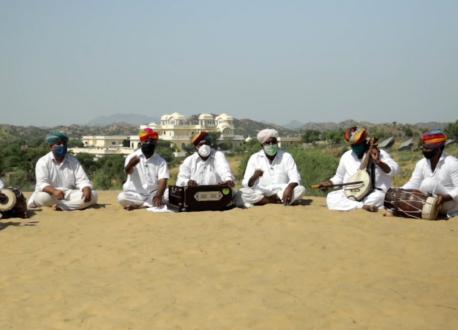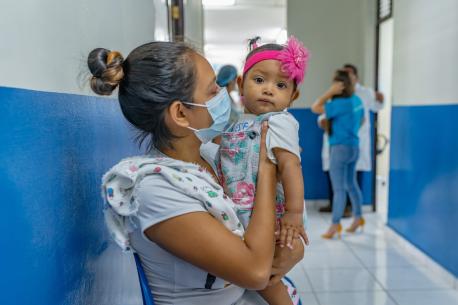
COVID-19 and the Holidays: How to Reduce Your Family's Risk
Health tips and advice to help you make wise decisions and keep loved ones safe this holiday season.
Planning a trip or end-of-year celebration? For many people, this time of year is associated with gatherings of family and friends, but the ongoing COVID-19 pandemic and the new Omicron variant raise many questions on how to stay safe. Whatever you have planned for the coming weeks, we hope these tips help you and your family enjoy a healthy holiday season.
Be risk aware
The level of risk depends greatly on where you live. Follow guidance from your local authorities and stay informed about COVID-19 transmission and vaccination rates in your area. In places with low rates of COVID-19 transmission and high rates of vaccination, there is less risk for fully vaccinated people, but unvaccinated people, including children, can still be at risk of infection.
It’s still recommended to continue taking precautions such as physical distancing, wearing a mask near others and frequent handwashing.
Different activities also carry different risks. For any in-person gatherings, consider whether others in the group are vaccinated, if they take precautions, and where and for how long you’ll be meeting — meeting outside and for shorter periods of time have less risk.
Get vaccinated
COVID-19 vaccines approved by the World Health Organization (WHO) are safe and have been shown to be highly effective at protecting against severe illness and death from COVID-19. The vaccines also help to protect those around you. No vaccine offers 100 percent protection though, so it is important to continue taking precautions to protect yourself and others even once vaccinated. This includes wearing a mask, physical distancing and regular handwashing.
>Read: What you need to know about COVID-19 vaccines
If you are feeling ill, stay home
Do not attend or host gatherings if you or someone in your family is sick or has symptoms of COVID-19. Stay home, seek medical advice and help stop the spread of COVID-19.
Consider any travel plans carefully
All travel comes with some risk of getting or spreading COVID-19. Before you travel, check if COVID-19 is spreading in your local area and in any of the places you are going.
Do not travel if you or your family are sick, have any symptoms of COVID-19 or have been around someone with COVID-19 in the past 14 days. Unvaccinated family members who are at higher risk for severe illness (older family members, those with underlying medical conditions) should consider postponing all travel until they are fully vaccinated.
If you do choose to travel, try to avoid traveling at peak times. Check for any travel restrictions, stay-at-home orders, quarantining and testing requirements in your local area, and all places you’re planning to visit. Keep in mind, these policies may change with little advance notice and your travel plans may be disrupted. If flying, carefully check the travel requirements of your airline carrier.
When you return home, follow recommendations or requirements from your national or local authorities, and continue to follow all the key precautions – including watching for any symptoms of COVID-19 and seeking medical advice if they develop.
> Read: Traveling with your family during the COVID-19 pandemic
Take precautions while in public
Here are some of the key precautions you and your family can take when outside:
- Avoid crowded places, confined and enclosed spaces with poor ventilation, and try to practice physical distancing from people in public, keeping at least 3 feet distance between yourself and others
- Wear masks when in public places where COVID-19 is widespread and physical distancing is not possible
> Read more on mask tips for families - Wash your hands frequently using soap and water or an alcohol-based hand rub
> Read more on handwashing - Avoid touching your face (eyes, nose, mouth)
- Seek medical care early if you or your child has a fever, cough, difficulty breathing or other symptoms of COVID-19
> Read: Staying safe outside during COVID-19
Avoid large gatherings
Crowded, confined and enclosed spaces with poor ventilation and mass gatherings such as concerts, events and parties can be especially risky. If possible, outdoor gatherings are safer. If you are planning a get-together with friends and family from different households, consider taking extra precautions before you meet, such as taking a COVID-19 test if available.
Consider the needs of your loved ones
The COVID-19 pandemic has been stressful for everyone and many people will be worried about being around groups of people, even their loved ones. If possible, try reaching out to your friends and relatives before meeting to see how they are doing and to talk about any concerns.
Consider postponing any visits to unvaccinated family members or friends who have an increased risk of severe illness from COVID-19 (older family members, grandparents, family members with underlying medical conditions) or taking extra precautions when around them. This may include wearing a mask, regardless of your vaccination status, and keeping children at a distance from those family members wherever possible.
Every family has to take decisions based on their own situation. Take the time to explain decisions and rules with your children —and why it matters.
>Read: How to talk to your friends and family about COVID-19 vaccines
Remember, our individual decisions don’t just affect us, but the people around us as well. Stay safe and we wish you and your family happy and healthy holidays!
TOP PHOTO: Outdoor activities are safer than indoor gatherings during the COVID-19 pandemic. In Yerevan, Armenia, a boy slides on a snow tube. © UNICEF/UN0432913/Grigoryan
HOW TO HELP
There are many ways to make a difference
War, famine, poverty, natural disasters — threats to the world's children keep coming. But UNICEF won't stop working to keep children healthy and safe.
UNICEF works in over 190 countries and territories — more places than any other children's organization. UNICEF has the world's largest humanitarian warehouse and, when disaster strikes, can get supplies almost anywhere within 72 hours. Constantly innovating, always advocating for a better world for children, UNICEF works to ensure that every child can grow up healthy, educated, protected and respected.
Would you like to help give all children the opportunity to reach their full potential? There are many ways to get involved.




